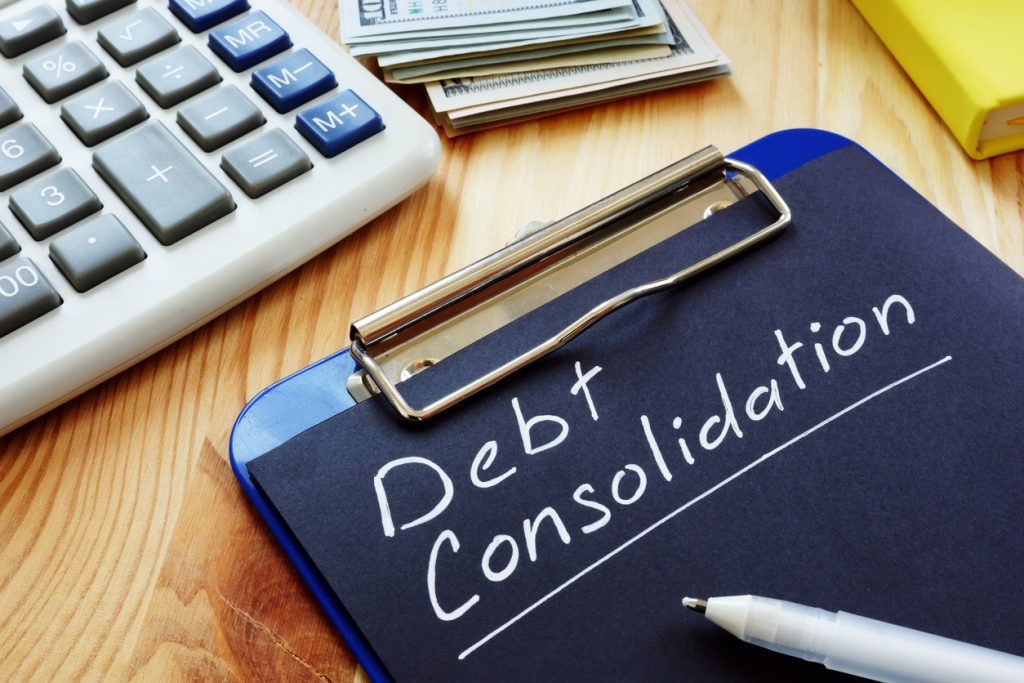If you have too much debt, you could be stressing about making your monthly payments. You may have difficulty keeping up with your other bills when you are overwhelmed with credit card bills and other debts. A possibility to improve your situation is to consolidate your debt into a new consolidation loan, potentially lowering your payments. But will debt consolidation hurt your credit?
In this article, Debtinate will reveal whether or not consolidating credit card debt will harm your credit scores. Learn more about this process below. If you have questions or want to apply for debt consolidation loans, one of our loan experts can help you today.
- Consolidate Credit Card Debt for Lower Payments and Reduced Debt to Income Ratio
- Consolidating High Interest Debt Can Raise Your Credit Scores
- Sign Up for Free Credit Reports with No Obligation
Debt Consolidation Can Help Your Credit
Generally, debt consolidation can be a good thing. You may get a personal loan or zero balance credit card and transfer your debts into the new debt consolidation loan. You will probably have a much lower interest rate than you have on your debt now.
Any time you apply for new credit, it will generate a hard inquiry on your report. This could temporarily lower your score by a few points. However, it is only temporary; after a few months of on-time payments, your score should be back to where it was, if there were no other credit changes.
When you consolidate debt, you initiate various factors that can either positively or negatively affect your credit. Here are some short-term effects that may cause a drop in your credit score during debt consolidation:
New credit applications: The initial impact on your credit scores may occur before consolidating. When you apply for a personal loan or a balance transfer credit card, the lender conducts a hard inquiry on your credit, leading to a slight decrease in your credit scores.
New credit account: Opening a new credit account, such as a credit card or personal loan, results in a temporary decline in your credit scores. Lenders perceive new credit as a fresh risk, causing a temporary dip in your credit scores when acquiring a new loan.
Lower average age of credit: Your credit scores typically increase as your credit accounts age and demonstrate a positive history of on-time payments. However, opening a new account contributes to a decrease in the average age of your credit accounts, which can temporarily lower your credit scores.
How Debt Consolidation Works
Debt consolidation rolls several high-interest debts into one loan, usually with a lower rate. The debt could be spread across several credit cards. You also could have other debts, such as payday loans, personal loans, and medical bills. It is possible to roll all of these loans into a debt consolidation loan.
When you apply for the new loan, you will transfer the debts to the new one. Or, if you get a balance transfer credit card, you can use the card to pay off your other debts. Then, you only have one debt to pay. Having fewer debt payments each month makes it simpler to deal with budgeting and making on-time payments, which could help you pay down your debt faster.
How Debt Consolidation Can Build Your Credit

Debt consolidation has the possibility of building your credit over the long term. It’s true that it could cause your score to slightly dip in the near term, but the long-term benefits make it well worth it. Here’s how debt consolidation can benefit your credit:
• Gives you a history of timely payments: Making payments on time is critical to keeping a high credit score. If you take out a debt consolidation loan and make the payments on time each month, your credit score should rise over time.
• Reduces your credit utilization: This is the amount of available credit you have, and it accounts for about 30% of one’s credit score. The less credit you are using, the better your credit score. When debts are consolidated and paid down or off, your credit utilization will decrease, which raises your score.
• Can enhance your credit mix: Having several different types of credit can boost your score. For example, if you have a mortgage, car loan, and a debt consolidation loan, this is a diverse credit mix and could benefit your score.
Debt consolidation loans have the potential to reduce your monthly payments and enhance your credit standing, provided you adhere to a repayment plan. Juggling multiple high-interest credit card balances can strain your finances, making it challenging to meet essential expenses or save money, and can even induce stress. In such circumstances, opting for debt consolidation could prove beneficial. However, before proceeding, it’s essential to delve into how debt consolidation may impact your credit scores.
Homeowners with equity in their property can leverage it to take out an equity home loan for consolidating debt, using their home as collateral. Compared to credit cards or personal loans, these options usually come with lower interest rates. However, it’s important to note that failure to repay could result in the loss of your home.
If you do not own a home, you should consider a personal loan for consolidating debt. Like a 2nd mortgage they feature a fixed simple interest loan that helps you rebuild your credit score with timely payments.
How Can Debt Consolidation Affect Your Credit Score?
Initially, most debt consolidation methods can negatively impact your credit score, lowering it temporarily for several reasons. For instance, debt management plans and often require you to stop using your credit cards. If you cancel a card, it reduces your available credit, which can lower your credit score.
When you apply for a consolidation loan, lenders perform a “hard inquiry” or “credit check” on your credit report, which temporarily decreases your score by a few points. If you shop around for the best loan and accumulate several inquiries within a short period, typically 14 to 45 days, credit bureaus treat it as a single inquiry. Conversely, if you have credit inquiries spread out over a longer period, credit bureaus interpret them as multiple attempts to gain credit, which affects your credit score more negatively.
Consolidating Debt with a Home Equity Loan
Homeowners have been taking out home equity loans to consolidate debt for may years. Having the ability to refinance credit card debt into a low interest fixed rate loan offers a lot of benefits. Ask your mortgage lender if you are eligible to consolidate debt with a home equity loan that offers terms that are appealing to you. When considering home equity financing or 2nd-mortgage, don’t forget to ask about the APR, closing costs, origination fees and any other potentially hidden fees. Visit the RefiGuide.org to compare the best home equity loan rates online.
Debt Consolidation with Personal Loans
A personal unsecured loan can be an effective way to consolidate debt if you have a good credit score. The lower your credit score, the more difficult it is to get approved for an unsecured installment loan with favorable terms, if you can get one at all. High interest rates and fees can negate any potential cost savings.
To minimize the negative impact on your credit, only borrow the amount you need to pay off your existing debt. Borrowing more than necessary increases your overall debt, which can be detrimental. Ask about a personal loan for bad credit with a guaranteed approval. Not many private money lenders are willing to take this kind of risk.
Balance Transfers
Credit card refinancing involves transferring your debt to a new balance transfer credit card with an interest rate as low as 0%. However, this introductory interest rate is only temporary, and these types of credit card accounts are challenging to obtain without a high credit score over 700.
Debt Settlement and Your Credit Score
Another option to consider if you have a lot of debt is debt settlement. This is negotiating forgiveness of a credit line in exchange for paying part of it. Debt settlement can reduce your financial burdens and help avoid bankruptcy. But debt settlement will damage your credit score.
Also, most debt settlement programs are run by companies that charge high fees for the service. You should think carefully about whether debt settlement is a solution. If you do decide to settle some of your debts, use care when choosing the company to help you. Make sure the debt settlement company has an excellent record and is well regarded by the Better Business Bureau.
It is better to consolidate your debts with a new loan instead of opting for debt settlement. Paying off your debts with a lower interest rate will preserve your credit rating.
However, there are situations where debt settlement could be wise; if you are facing bankruptcy, it is better to attempt to reach settlement agreements with your creditors if you can. Also, it is preferable to set up a debt settlement plan than to not ap the accounts at all. Keep in mind that debt settlement will result in a lower credit score for you for several years.
If you ignore the debt entirely, the account may be turned over to a collection agency and could result in a lawsuit. The collections will also turn up on your credit report for up to seven years.
How Long Settled Accounts Stay On Your Credit Report
Before you decide to settle your accounts instead of getting a debt consolidation loan, keep in mind that settled accounts hurt your credit score and stay on your credit report for seven years.
Summary on Debt Consolidation and Rebuilding Your Credit History
Debt consolidation is a great way to reduce your debt and interest rate. If you can qualify for a low-interest personal loan, you can move all of your unsecured debt into the new loan and save potentially thousands in interest. If you can qualify for a zero-interest balance transfer credit card, this also is a smart way to save interest.
Debt consolidation can help lower your monthly payments and improve your credit, but only if you adhere to a plan to pay down your debt. If you have high-interest credit card balances across multiple accounts, making those monthly payments can be so challenging that you can’t afford the things you truly need or want, let alone save any money. This situation can also cause significant stress. In such cases, debt consolidation might be a smart decision. However, before proceeding, it’s essential to understand debt consolidation and how it can impact your credit scores
Debt consolidation could cause a slight dip in your credit score initially, but long term, your credit will improve as your debt is reduced.
However, if you decide to settle your debts and pay a fraction of what you owe, your credit will be affected for years. Just keep this in mind before you decide on debt settlement.
